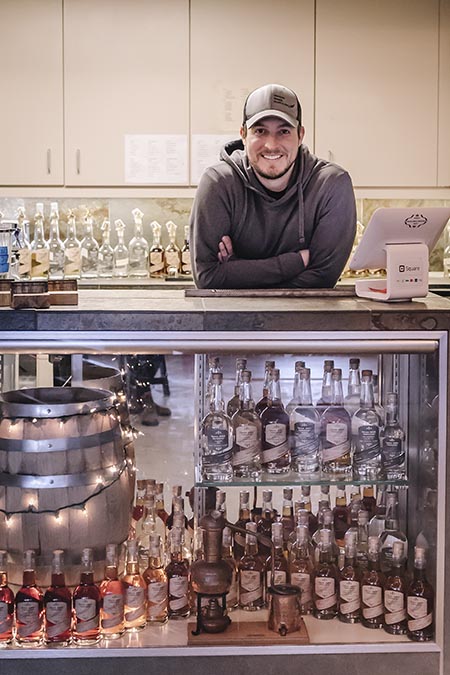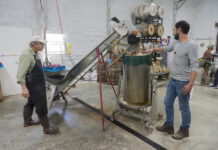
Why did you get into the craft-spirits business? Most people have an answer similar to Mike Selberg, founder of Cannon Beach Distillery in Oregon: “I had no real experience in the industry, I just knew I wanted to make the best spirits possible.” Selberg started distilling in his friend’s garage before moving into an 1,100-sq. ft. distillery/tasting room in his hometown of Cannon Beach. As a 27-year-old, first-time business owner, he says he was naive about how the spirits business operated in Oregon. “I did my homework, plus the state offers this seminar about how to get started, how the system works, etc.,” he says, “but I discovered there was a lot more they didn’t explain that I had to learn the hard way.”
Selberg pursued a grain-to-glass ethos, and in just his second year, won the ADI Best of Class award for rum. That led to an increase in sales, a bigger facility by the beach and hiring his first employees. Based on his understanding of the regulatory regime in Oregon, he decided to focus on the higher-margin tasting room sales available in his touristy beach town. What he didn’t realize until later was that his in-state competitors didn’t share his ethos: “I just assumed everyone was doing grain-to-glass like I was. But then I discovered they were all blending and using GNS, producing at a much lower cost than I was. Their products weren’t as good as mine, but the regulatory structure actually incentivized the shortcuts. The more value I added to my products, the more I had to pay the state, and after a few years I determined it just wasn’t sustainable. It’s like Oregon doesn’t want craft distillers.”
Selberg crashed into the brick wall of state regulations that distillers across the country deal with. Due to the legal framework regulating alcohol in the US, there are not only federal regulations but unique regulatory regimes in each state as well. “It really is like dealing with 50 different countries, and it can be extremely confusing for distillers who are usually more artisan than attorney,” says Chris Swonger, president and CEO of the Distilled Spirits Council. “Some states are more advantageous for distillers than others, and much of that is due to the lobbying efforts within the state. The regulatory regime in a state will determine what business practices are allowed and, by extension, which business models will be successful.”
Oregon has a complex regulatory regime that, according to Selberg, disincentivizes grain-to-glass distilling by charging a fee on the sale price instead of on volume, and controlling where and how products can be sold in the state-owned liquor stores. “Last year I paid the state about 35% of my total sales, whereas a cheap $8 bottle of GNS vodka pays a fraction of that. I’ve been accused of wanting special treatment, but it just seems crazy that the more value you add, the higher the rate the state takes from you. How can any craft distiller grow a business here?”
Like many craft distillers, Selberg set up shop in his home state, where he had grown up and had roots and relationships. While that makes perfect sense for life planning, it can wreak havoc on your business planning. As Timo Marshall, co-founder of Spirit Works in Sebastopol, CA, and the former president of the California Artisanal Distillers Guild explains, when it comes to setting up your distillation shop, “The first thing you need to do is figure who you want to be, what you want to make and then learn the laws of the states you’re thinking of doing business in and really educate yourself on what the regulations are, because they will determine your success as much as the quality of your products.” Marshall suggests the first step for anyone wanting to open a distillery is to read all the laws and then call the state distiller guild and reach out to national organizations like ADI, the American Craft Spirits Association (ACSA) and the Distilled Spirits Council of the United States (DISCUS) and tap their resources. “As if understanding all that isn’t challenging enough for most would-be distillers, the laws are also constantly changing, especially now, and you need to keep on top of all that not only because you may be able to take advantage of changes, but you also don’t want to run afoul of the law because you didn’t keep up on it.”
Insert here the old saw that says if you want to maintain any respect for the law or sausage, you should never watch either being made. The laws governing spirits production and sales are largely determined not by what’s best for the public or even what lawmakers think is best, but by the activity of political lobbyists and whoever pumps the most money into the system, greases the most palms and has the most political clout. Traditionally, that has been the big producers and distributors, leaving smaller craft producers’ interests underrepresented.
“The little guys like us really are at a disadvantage,” says Marshall. “The tide is turning in a lot of states as the politicians see that more small distillers means added tax and tourism dollars, not to mention jobs and a sexiness factor because liquor is popular. That’s why my top suggestion is to get involved. Network and connect with the other distillers but also brewers and winemakers in your state, pool your resources, reach out and utilize the resources the state guilds and national associations have, because there are a lot more of us small guys than big guys, and the only chance we have to get the laws working for us is to join together and get involved. Even then, the big distributors here in California tried to shut us down — and almost did. Luckily, we had the truth on our side, but that doesn’t always win the day in politics.”
Swonger says that’s why DISCUS, which represents all spirit producers both big and small, has launched a new platform called Spirits United (www.spiritsunited.org; ADI is a partner), with the goal of bringing together members of the spirits industry, its partners and consumers to ensure drinkers can enjoy distilled spirits where, when and how they want and distillers can profit from them. Swonger hopes the Spirits United initiative “becomes a megaphone for craft distillers to get heard and help produce legislation on the local, state and federal levels that grows their businesses. Craft distillers should use the resources we have available to them, whether it’s lawyers who know the state regimes and can help them plan their business models, getting involved in the Agriculture Department’s Market Access Program, where the government pays to get you access to foreign markets or just letting us know there’s an issue you’re dealing with, because if we don’t know there’s a problem, we can’t help you fix it.”
Marshall explains, “It’s a pain to have to move to another state if your home state has bad laws, but it’s probably easier than banging your head against a wall trying to make grain-to-glass work when the laws in your state aren’t conducive. Your only options are to get involved and get the laws changed. Lobbying takes time, coordination and money, and ultimately you have to convince the politicians it’s in their best interest to support you. But moving your operation can be just as time- and resource-consuming. That’s why it’s best to think about this stuff before you get started, to make sure the business you want to create is possible or if not, what business will be viable, and can you get excited about that?”
“One thing you shouldn’t expect,” says Michael Kinstlick, CEO of Coppersea Distilling in New Paltz, NY, “is for the law to bend to you. You need to be creative and figure out how you can thrive within it. You do that by figuring out who you are, what you want to produce, how you want to sell it and then the best place to do that. I mean, if your dream is to make grappa, even if the laws are on your side, that may not be viable because there’s just not a huge market for grappa. Just because you can make a quality product doesn’t mean you can make a viable business out of it in your state.”
“I wish someone had explained that to me before I started Cannon Beach Distillery,” says Selberg. “I tried to get the laws changed here but the politicians just didn’t care. So, after a lot of thought, I made the tough decision to close up shop, because I just don’t see how I can make money making a great grain-to-glass spirit here, and since no one else can, I couldn’t even sell the business.” But having learned this lesson the hard way, he knows where he’s headed next. “I’m not sure if I’ll open another distillery after this experience, but I am moving to Colorado, because if I do, at least I know I’ll have a chance at success doing it the way I think it should be done… because the laws there allow for it.”








